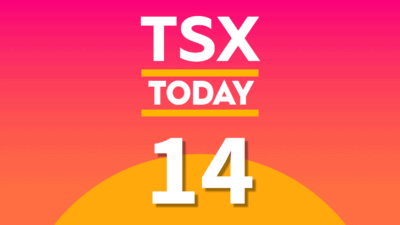Metro (TSX:MRU) is a Canadian food and pharmacy retailer and distributor that operates a network of supermarkets, discount stores and drugstores. The company reports two business segments: food operations and pharmaceutical operations.
Metro reports a market capitalization of $13.81 billion with a 52-week low of $45.81 and a 52-week high of $59.03.
Intrinsic price
Based on my calculations using a discounted cash flow (DCF) valuation model, I determined that Metro has an intrinsic value of $148.51 per share.
Assuming less than average industry growth, the intrinsic value would be $147.21 per share and higher than average industry growth would result in an intrinsic value of $149.84 per share.
At the current share price of $54.36, I believe that Metro is substantially undervalued. Investors looking to add a grocery conglomerate to their RRSP or TFSA should consider buying shares of Metro.
Metro has an enterprise value of $40.4 billion, which represents the theoretical price a buyer would pay for all of Metro’s outstanding shares plus its debt.
One of the good things about Metro is its low leverage with debt at 16% of total capital versus equity at 84% of total capital.
Financial highlights
For the fiscal year ended September 28, 2019, the company reported a strong balance sheet with retained earnings of $4.2 billion, up from $3.9 billion at FYE 2018.
This is a very good sign for investors as it indicates the company has more years of cumulative net income than net loss which gets reinvested into the company to fuel growth.
Metro reports cash and equivalents of $273 million with $462 million in current liabilities. While company does not have enough cash on hand to cover its short-term debt obligations, my concerns are abated given the company’s $600 million unused revolving credit facility.
Overall sales are up materially from $14.4 billion in 2018 to $16.8 billion in 2019 (+16.6%), likely driven by its acquisition of Jean-Coutu.
In 2018, Metro disposed of its stake in Alimentation Couche-Tard for gains of $1.1 billion on the sale and pre-tax income of $2.1 billion. In absence of this divestiture, the company’s pre-tax income is $969 million in 2019.
From a cash flow perspective, senior management is fiscally responsible as indicated by its $54 million pay down in long-term debt ($995 million pay down in 2018). This is offset by draws on long-term debt of $47 million in 2019 and $2.2 billion in 2018.
The company also had a cash outflow of $3 billion in 2018 related to the Jean-Coutu acquisition. I believe that the Jean-Coutu acquisition will deliver substantial returns to Metro in the near future, as it allows the company to cross-sell its products, thereby reaching a larger audience.
Capital expenditure spending is up year over year at $357 million in 2019, compared to $286 million in 2018 (+24.7%). This is a good sign, as it indicates the company is investing in itself.
Foolish takeaway
Investors looking to buy shares of a grocery conglomerate should consider buying shares of Metro. The company reports positive retained earnings and increased revenues complemented by the acquisition of Jean-Coutu in 2018, which will undoubtedly drive growth for Metro in the coming years.
At its current share price of $54.36 and an intrinsic value of $148.51, I believe Metro has a 173% potential upside. RRSP and TFSA investors should consider adding it to their portfolio today!
 Spring Sale
Spring Sale







